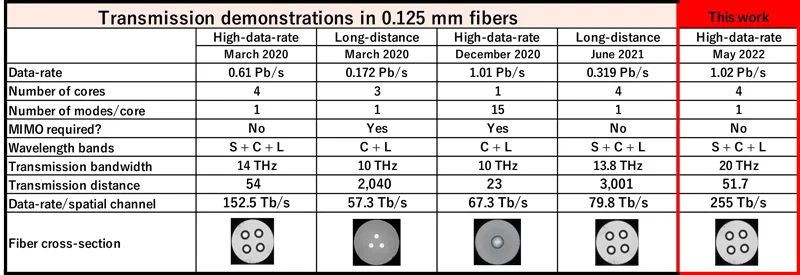News
Japan Sets New Record For Data Transmission Speed
The researchers have absolutely smashed their own previous achievement by transmitting data at a jaw-dropping 1.02 petabits per second.

A team of researchers from the National Institute of Information and Communications Technology (NICT) in Japan is at it again. After achieving a data transmission speed of 319 terabits per second (Tb/s) last year, the researchers have now absolutely smashed their own previous achievement by transmitting data at 1.02 petabits per second (Pb/s).
Since 1 petabits is 125,000 gigabytes, it means that the team could theoretically transmit more than 31,000 movies in 4K resolution every single second. To make the record even more impressive, it’s important to highlight that it was achieved using fiber-optic cables with four cores, which is exactly how many cores were used to set the previous record.
“NICT constructed the transmission system using 4-core MCF with standard 0.125 mm cladding diameter, WDM technology and mixed optical amplification systems. The system allowed a data transmission speed of 1.02 petabit per second over 51.7 km,” explained the researchers in the official press release.

The mind-blowing record was first presented in May at the International Conference on Laser and Electro-Optics (CLEO) 2022 in San Jose, California, one of the largest international conferences related to optical devices and systems.
Also Read: Microsoft Blocks Lebanon-Based Hackers Targeting Israel
Moving forward, the NICT team wants to continue exploring different ways to transmit data faster across fiber optic cables. Their main focus is on low-core-count multi-core fibers with standard cladding diameter because such cables are comparable to standard single-mode fibers and thus more attractive for early adoption.
With dozens of countries around the world actively moving from 4G to 5G broadband cellular networks, the massive amount of data being sent and received is guaranteed to continue increasing at a rapid pace. Research projects such as the one behind the latest record can pave the way for new fibers capable of meeting the growing demand and supporting new bandwidth-hungry services.
News
Rabbit Expands Hyperlocal Delivery Service In Saudi Arabia
The e-commerce startup is aiming to tap into the Kingdom’s underdeveloped e-grocery sector with a tech-first, locally rooted strategy.

Rabbit, an Egyptian-born hyperlocal e-commerce startup, is expanding into the Saudi Arabian market, setting its sights on delivering 20 million items across major cities by 2026.
The company, founded in 2021, is already operational in the Kingdom, with its regional headquarters now open in Riyadh and an established network of strategically located fulfillment centers — commonly known as “dark stores” — across the capital.
The timing is strategic: Saudi Arabia’s online grocery transactions currently sit at 1.3%, notably behind the UAE (5.3%) and the United States (4.8%). With the Kingdom’s food and grocery market estimated at $60 billion, even a modest increase in online adoption could create a multi-billion-dollar opportunity.
Rabbit also sees a clear alignment between its business goals and Saudi Arabia’s Vision 2030, which aims to boost retail sector innovation, support small and medium-sized enterprises, attract foreign investment, and develop a robust digital economy.
The company’s e-commerce model is based on speed and efficiency. Delivery of anything from groceries and snacks to cosmetics and household staples is promised in 20 minutes or less, facilitated by a tightly optimized logistics system — a crucial component in a sector where profit margins and delivery expectations are razor-thin.
Despite the challenges, Rabbit has already found its stride in Egypt. In just over three years, the app has been used by 1.4 million customers to deliver more than 40 million items. Revenue has surged, growing more than eightfold in the past two years alone.
Also Read: Top E-Commerce Websites In The Middle East In 2025
CEO and Co-Founder Ahmad Yousry commented: “We are delighted to announce Rabbit’s expansion into the Kingdom. We pride ourselves on being a hyperlocal company, bringing our bleeding-edge tech and experience to transform the grocery shopping experience for Saudi households, and delivering the best products – especially local favorites, in just 20 minutes”.
The company’s growth strategy avoids the pitfalls of over-reliance on aggressive discounting. Instead, Rabbit leans on operational efficiency, customer retention, and smart scaling. The approach is paying off, having already attracted major investment from the likes of Lorax Capital Partners, Global Ventures, Raed Ventures, and Beltone Venture Capital, alongside earlier investors such as Global Founders Capital, Goodwater Capital, and Hub71.


























